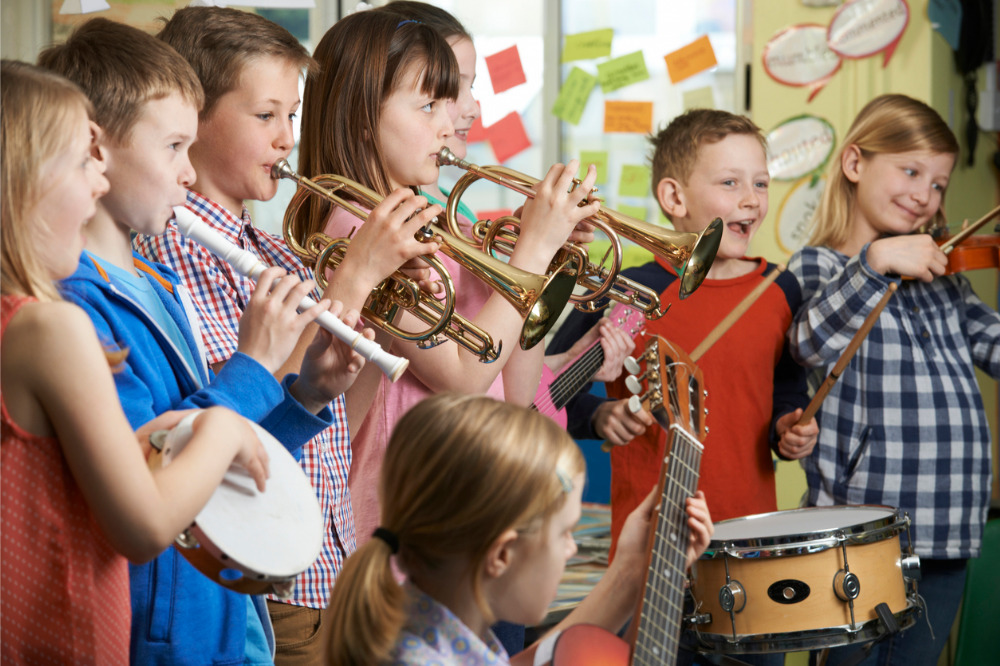
In Australia, one million primary school students aren’t learning music as part of their day-to-day education, even though the importance and positive impacts of music education at a primary school age has been widely researched and reported around the world.
A growing body of research shows that singing and playing music can be effective ways of boosting young people’s learning outcomes, as children who are constantly exposed to music are found to exhibit longer attention spans, emotional stability, resilience, and cognitive capacity.
On 7 June, an event at the Sydney Opera House brought together several experts who highlighted the ways in which music education can have a profound impact on the confidence and learning outcomes of young people.
‘Music is the way’
Professor Pasi Sahlberg, a world-renowned education expert who works at the Southern Cross University’s faculty of education, says music “has a power to heal people, give nations their independence, and stop wars”, and that a growing body of research suggests music education could very well save our schools, too.
“During last 10-20 years we have tried almost everything [to fix out schools], but the one thing we haven’t tried is music – rock and roll,” Professor Sahlberg told the audience.
“We need to teach children something new in the school… have them be excited to come to school. Music is the way.”
Professor Sahlberg pointed out that most Australian students do not have a dedicated music teacher and that the quality of young people’s music education can vary significantly depending on where they live.
“In high school, my dream was to become a primary school teacher. In Finland, all primary school teachers are also music teachers. It’s a requirement,” he said.
“Not having a consistent music teacher and program here is a chronic problem.”
‘Music is how I learned to be confident’
Taking the stage after Professor Sahlberg’s talk, Sarah Donnelley, deputy principal of Wilcannia Central School, said she was privileged to have had a strong music education all throughout her education.
During lockdown, Wilcannia Central School produced a video of Donnelley and her students singing along to Paul Kelly and Kev Carmody’s hit song, ‘From Little Things, Big Things Grow’.
The video, which soon went viral, demonstrated that community involvement through music can be a powerful way of uniting rural residents suffering under the weight of the COVID-19 pandemic.
In 2020, Donnelley won the ARIA Music Teacher Award, co-founded by The Song Room and ARIA in 2017, which recognises the importance of music education and teaching children to embrace music education opportunities.
“I had an incredible primary school music teacher. I sang in a band as a front woman and that’s where I grew up and learnt how to be confident,” Donnelley said.
“It wasn’t until I went to university that I realised how lucky I was with my education and having such a strong focus on music. I am not only a music teacher – I’m a primary school teacher. The reason the ARIA award came about is because music is embedded into everything I do.”
Donnelley said having a specialist music teacher was the reason why she was able to harness her love of music throughout kindy to year 6.
“If you don’t have an experience of music, it’s hard to share it. I still share the songs with my students that I learnt when I was 5-6 years old. I am a big advocate that all creative arts should be embedded all across our curriculum. But how can you teach something you don’t understand,” she said.
“Music is a part of our school day from the start to the end. It may not be a part of our curriculum but it’s part of everything we do and that’s what separates us.”
‘I always teach my music classes like a live show’
Ricky Kradolfer, co-founder of Amplify Music Education, said that as he grew up, music became a part of his self-identity.
“I ended up getting to teach guitar, turning my bad experiences of feeling isolated when playing a song, instrument etc so students now growing up can channel their passions and get to explore that side of their identity,” he said.
“I have worked with more than 70 schools. I always teach my music classes like a live show. I do my best to make sure the kids are engaged so when they leave the session, they can think to themselves “that was so fun.”
Kradolfer says nourishing young people’s musical interests has been core to the way he teaches the subject.
“If it’s rock and roll, then rock and roll it is! If it’s hip hop, it’s hip hop or pop etc. The kids drive it. Music is part of the creativity that is already part of a child,” he said.
“We need to give kids more respect about what their interests are. If you can make them excited about coming to school, you can make them want to learn in the classroom too.”
Donnelley agreed with Kradolfer’s view that education has to be based on a child’s interests.
“Before they bring their backpack to school, where they pack their tangible needs, they bring a backpack of their dreams and interests – we need to help them unpack that backpack,” she said.
Donnelley asked the audience to make rain sounds via clapping and stomping, before adding that “music is the most inclusive art form there is”.
The evening closed with the speakers inviting audience members to come play and sing Heroes by David Bowie as a thank you to all the work done by teachers every day. Many stayed back.


